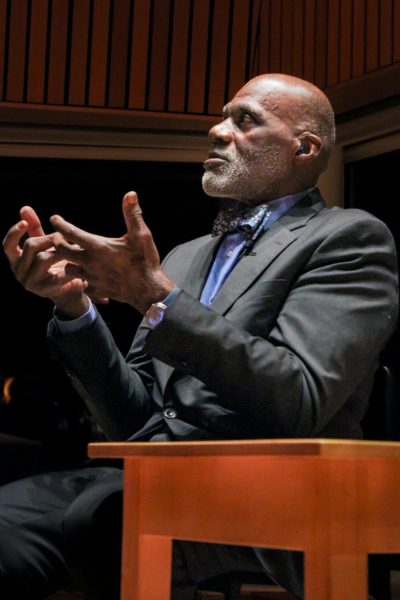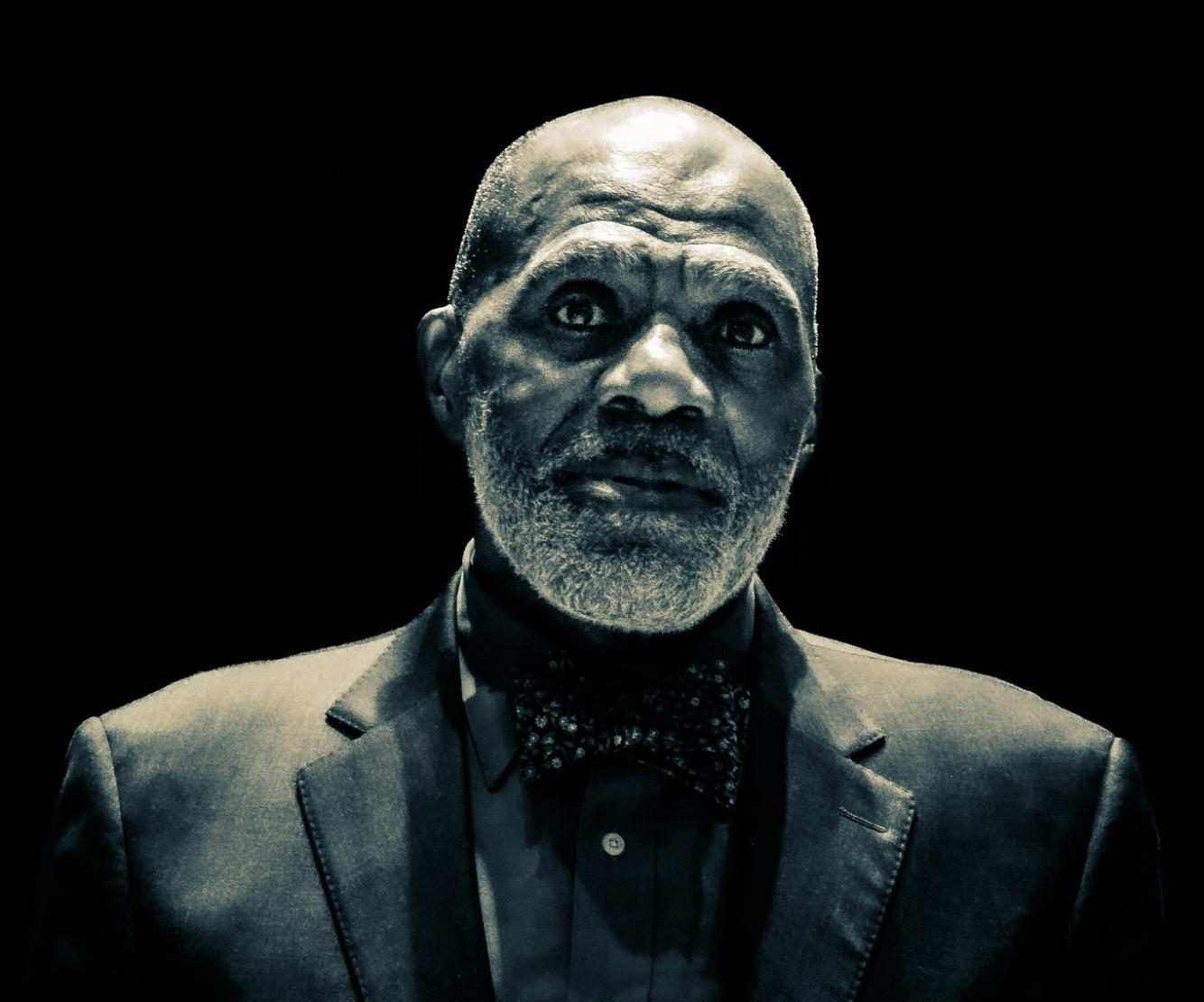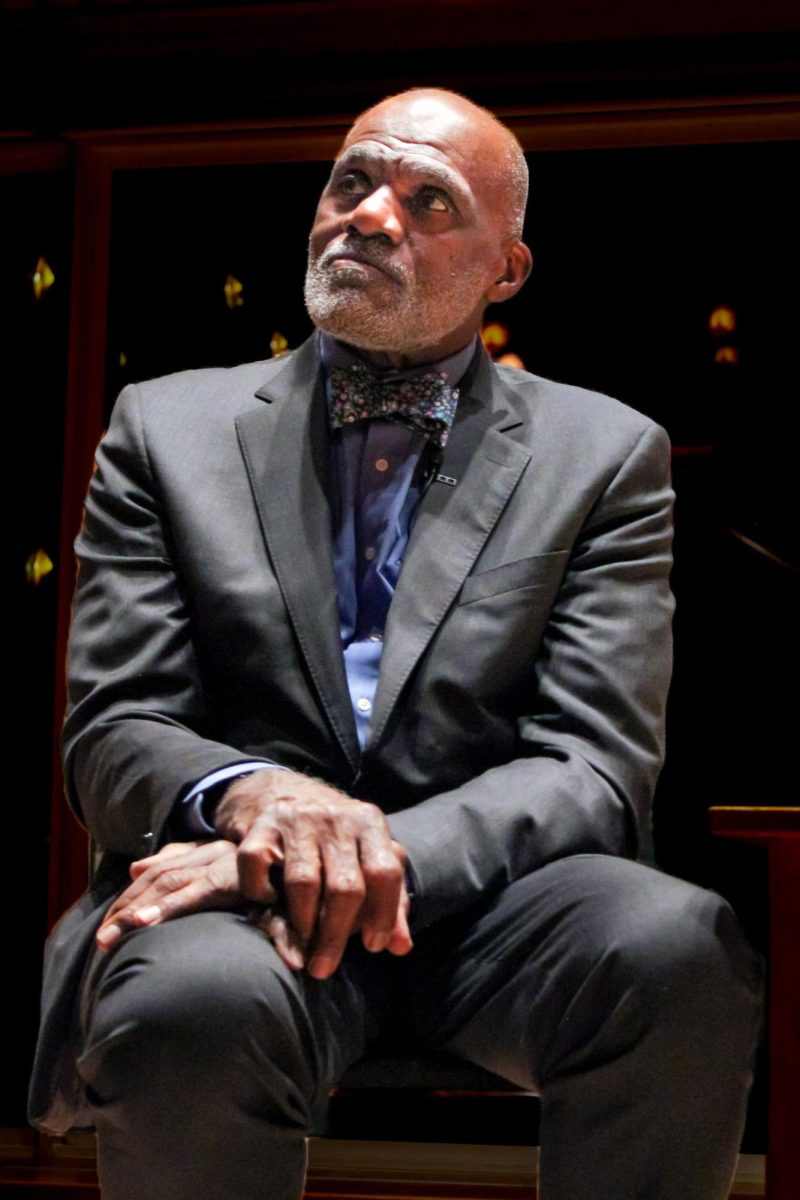When Alan Page spoke at Grinnell College on April 4, 1984, he had recently concluded an exceptional career in the National Football League, highlighted by a Most Valuable Player award and four Super Bowl appearances with the Minnesota Vikings.
At that point, he had achieved a profound level of athletic success only few manage to accomplish.
Page was not satisfied resting on his laurels, however.
Instead, he decided to change course, hanging up his pads and pulling out the books.
Returning to Grinnell on Jan. 26, Page spoke especially to the second half of his life — a period that included law school, his election to the Minnesota Supreme Court and the establishment of the Page Education Foundation.
“I’ve never been one to spend a lot of time looking in the rearview mirror,” Page said in his opening remarks. “When we drive, what do we use it for? So we can go forward. Not to admire what’s behind this.”
Page spent the majority of his talk doing just that — looking forward. He urged everyone in the audience, in particular the student-athletes, to always be thinking about what comes next. Swarms of student-athletes and community members approached Page after the talk, asking for photographs and autographs.
“No matter how stellar and how much money you make, that career is going to come to an end,” Page said, speaking to the life of a professional athlete. “When I was playing, you didn’t make enough money to last you the rest of your life. Even if you did, well, you’re going to be sitting around all day counting your money?”
“So the question becomes, what is it that you want to do in life? Young people and young professional athletes are starting to think about that and that’s a good trend,” Page said.
The conversation between Page and Jani Springer, assistant athletic director for diversity, equity, inclusion and student success, was hosted by the Rosenfield Program as a celebration of Martin Luther King, Jr. Day. More than 150 people were in attendance, including dozens of community members in addition to students, faculty and staff of the College.

Page spoke with great admiration for Martin Luther King, Jr., emphasizing the many lessons and ideas imparted by Dr. King that remain relevant today.
“What’s important to remember about Dr. King is his non-violence and the notion that we can use peaceful means to change people’s lives and people’s conduct,” Page said. “Ultimately, I suppose the goal is to change people’s minds. I don’t particularly care about changing anybody’s mind. I want to change the conduct. Treat me fairly, and you can think what you want.”
In order to gain the respect of others, Page spoke about the significance of seeking excellence in every facet of life.
“Be as good as you can be at what you’re doing, not as good as the next person. If you’re going to be a doctor, be the best doctor. If you’re going to be a garbage collector, be the best garbage collector, because that’s the only way you’re going to achieve and reach your full potential.”

Page received his J.D. from the University of Minnesota Law School in 1978 before working for a law firm in Minneapolis and serving in the Minnesota Attorney General’s office for seven years. In 1992, he sought election to the Minnesota Supreme Court.
“They started down the path of — ‘He’s just a football player. Not only that, he’s just a dumb black football player.’” Page said, referring to what some people said about him seeking election.
However, despite vocal opposition, Page became the first African American to be elected and serve on the Minnesota Supreme Court and became the biggest vote-getter in Minnesota history when he was reelected to the bench in 1998. Page served until he reached the mandatory retirement age of 70 in 2015 and was awarded the Presidential Medal of Freedom in 2018.
“People talk about my having gone to law school while I was playing professional football — ‘gee, wasn’t that hard?’ Page said. “Well, being as good as you can be at whatever you’re doing is hard. And whether it’s hard in two arenas or four arenas, it’s no more hard. It’s just different.”
In 1988, the same year he was inducted into the Pro Football Hall of Fame, Page and his wife, Diane Sims Page, launched the Page Education Foundation to mentor youth and provide academic opportunities to children of color.
The Foundation has more than 500 scholars annually and has awarded over $16 million in grants to more than 8,000 Page Scholars. According to the Foundation’s website, Page Scholars have volunteered nearly 500,000 hours, working with 50,000 children across Minnesota.
Throughout his talk, Page continuously stressed education as a path to justice.
“Education is a tool that anyone can use to achieve their hopes and dreams. No matter who you are, no matter what those hopes and dreams are, no matter what obstacles you’re confronting.”
The end of affirmative action, Page said, threatens to make education less accessible to the people who would most benefit from it.
“We’ve forgotten what affirmative action was for. Its whole purpose was to address the present effects of past discrimination. Put aside the present effects of present discrimination. We have not overcome the present effects of past discrimination.”
But Page pointed to the audience as he explained that there will always be hope for the future — hope that the lives of the least fortunate can be slowly improved by providing them with the resources to succeed in the classroom.
“Each of us has the power to change the future,” Page continued. “All we have to do is figure out what action we want to take. We’ll do it in different ways. Some will be in big ways, and some will be smaller. All of it is making the future better.”
In addition to his work mentoring youth in Minnesota, Page has written four children’s books and is currently working on a fifth.
Page said he sees the books as a way of reaching out to support youth.
“Every one of us is influenced by those that we can reach out and touch.”









Aimee Jackson • Feb 7, 2024 at 4:56 pm
Justice Page is a role model for all, a tireless promoter of education, justice, and equity. By the way, he’s written and published four children’s books and is currently working on his fifth. 🙂